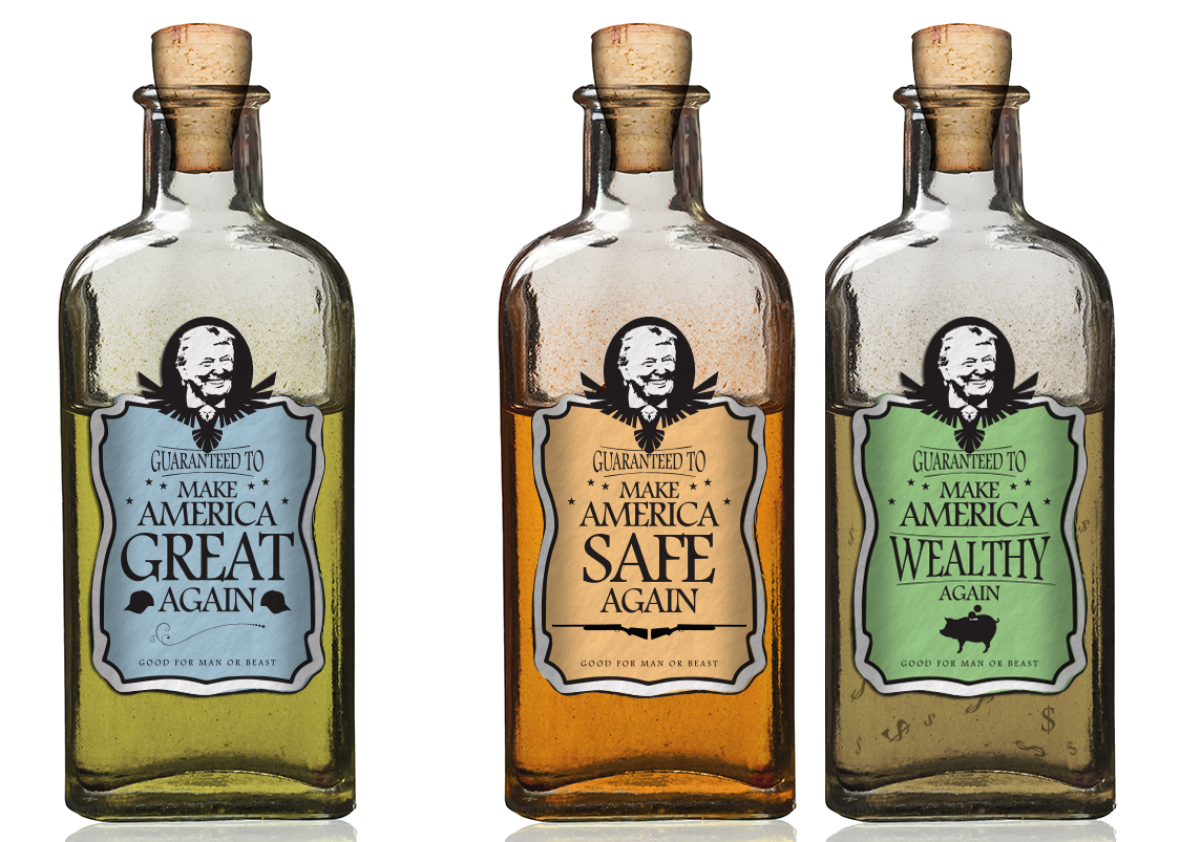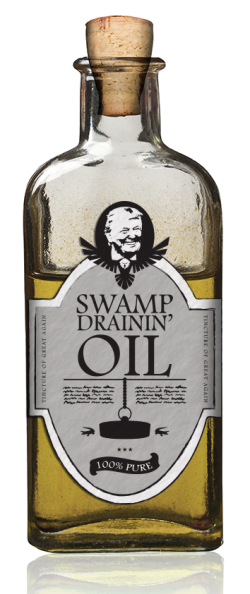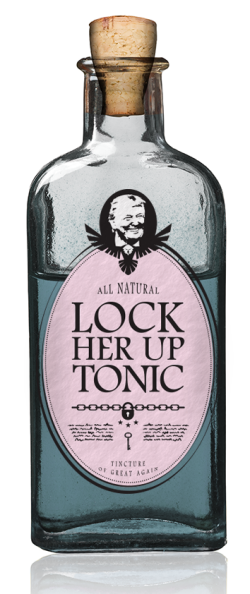Trump Sold America a Miracle Cure
But when miracle cures fail, the patients don’t blame the salesman.

Photo illustration by Slate. Photos by iStock and Jim Watson/AFP/Getty Images.
“Lock her up!” they had chanted at his rallies. True believers put it on shirts and hats and the coffee mugs that would be filled with liberal tears. “Lock her up!” It wasn’t just a demand. It was a mantra.
But no attempt will be made to lock up Hillary Clinton.
“That plays great before the election,” smirked Donald Trump at the Michigan stop of his self-congratulatory “Thank You” tour, hushing the crowd with a series of Trumpian hand gestures as if he were casting a spell. “Now we don’t care.”
And just like that, they didn’t. Supporters smiled, silenced.
“Drain the swamp!” they had chanted, another mantra that evoked a nostalgic fantasy of America, great again, purified of rot and darkness.
But the swamp will not be drained. Instead, it has been stocked with billionaire donors, hand-picked for our billionaire president by longtime Washington insiders. These people live in a bubble so isolating that some required briefing on the price of milk.
“He is going to need some people to help guide him through the swamp,” said Trent Lott, the former Republican Senator turned big-time lobbyist. “We are prepared to do that.”
And just like that, Trump’s supporters changed their principles. “If he has to use swamp people to make America great again, why not?” said Fred Harris, a 42-year-old Trump voter who once took part in the chant at a Pennsylvania rally.
There are many who hope Trump’s supporters will hold him accountable. That they will insist he fulfill his promises about jobs or universal health coverage—and when those promises are broken, that their fervent support will turn into rage at having been duped, causing Trump anguish and eventually costing him re-election.
This is wishful thinking. Trump’s rise to power has followed a similar trajectory to that of quacks who peddle panaceas to the desperate—a bizarre and heartbreaking world I’ve long studied. Just like them, Trump will fail to deliver. But his supporters will find a way to exonerate him. Consider the ability of one “Archbishop” Jim Humble—a former gold prospector who claims extraterrestrial lineage—to persuade parents to pump their autistic children full of Master Mineral Solution, even though MMS, when activated by citric acid, becomes a dangerous form of industrial bleach. Or “Gerson” therapy evangelists, who talk cancer patients into paying thousands to detoxify with organic juice at a Tijuana, Mexico, clinic, despite studies showing the therapy is ineffective (unsurprising given that it was developed not by oncologists, but an early 20th-century Viennese doctor named Max Gerson as an unsuccessful tuberculosis treatment).
When people make big bets on miracle cures that fail to work, they rarely turn against the treatments or their merchants. Instead, they rationalize their misplaced faith, in order to save face, remain hopeful, and preserve an identity that’s defined by their courageous ability to reject the status quo.
The kinship between Trump and peddlers of scientifically questionable medical advice couldn’t be clearer. Our president actively seeks out their company—from Robert F. Kennedy Jr., noted vaccine alarmist, to Dr. Oz, on whose show Trump pretended to be transparent about his health. It was a perfect match: Trump embodies the dubious therapies that Oz has endorsed—“miracle” diet beans, energy healing—and resembles Oz himself, a showman slinging half-truths and magical thinking to a hope-starved audience.
For those who reject such men, the appeal never fails to astonish. A doctor named Oz who wants you to believe in miracles? Come on. That’s like a pastor named Dollar who wants congregants to pay for his jet, or an unhinged narcissist who lives in a gold-plated apartment running as a populist president. Who, after weighing all the evidence, could actually take them seriously? Only credulous fools, right?
I used to think so, until about a decade ago, when my father called to ask if I knew anything about “zapping.” He told me that a close family friend, plagued by chronic health issues, had turned to a therapeutic machine named, incredibly, the Zapper. The contraption was designed by Hulda Clark, a naturopathic doctor who authored books with titles such as The Cure for All Diseases and The Cure for All Cancers, only to die in 2009 of blood and bone cancer.
This family friend was a trained nurse and the widow of a physician. Sharp, articulate, educated, nobody’s fool—and there she was, zapping herself with a machine invented by someone who died of what it supposedly prevented. I remember feeling the same punch-in-the-gut disbelief about her decision that I do today about people who voted for Trump. How could you fall for it? But decisions like hers are not exclusive to fools. Oz’s popularity is about more than a lack of critical faculties. And it is not only racists, misogynists, the ignorant, and the economically disadvantaged who voted for Trump.

Photo illustration by Slate. Photos by iStock andJim Watson/AFP/Getty Images.
Many who trust Trump to heal our body politic do so for the same reasons that people like my friend—normal, reasonable people—trust quacks to heal their bodies. They have been swayed by a powerful confluence of factors—specifically, epistemic uncertainty, existential panic, and anti-elitism. These factors ensure that even when reality hits, when insurance rates go up but the wall does not, the marks will place the blame somewhere else.
Epistemic uncertainty—the idea that traditional sources of knowledge cannot be trusted—has long been exploited by disingenuous medical gurus to attract patients. Their techniques mirror those that Trump brought to the broader public: Earn sympathy by identifying genuine problems—corrupt pharmaceutical companies that suppress data and bribe doctors, for instance, or entrenched corporate lobbying in Washington. But instead of proposing nuanced fixes—as an honest person would—exploiters of epistemic uncertainty turn these legitimate critiques into crude rhetorical bombs that allow them to attack the entire system. Big Pharma becomes a deceptive force of satanic proportion, invoked by anyone who wants to hawk an unproven treatment or assert the dangers of a treatment proven safe.
In the haze of these attacks, anything seems possible. Epistemic uncertainty undermines rational evaluation. Emotion and tribalism, already significant factors in determining one’s worldview, become the dominant source of beliefs. Vaccines might cause autism. Zapping might cure cancer. Climate change might be a Chinese hoax. A man in New Jersey might have been behind the Democratic National Committee hack. After all, who can you trust when the Food and Drug Administration is run by Big Pharma?
Once the purveyors of uncertainty have earned their audiences’ trust—and undermined their belief in any other source of information—it becomes virtually impossible to hold those purveyors accountable. Did organic juice detoxification fail to cure the cancer? Blame biased mainstream medicine for administering deadly chemotherapy beforehand. Does Trump’s new insurance plan fail to cover everyone? Blame Democrats for insisting that it shouldn’t—a fact the mainstream media refuses to report.
Yet even in a world infected by epistemic uncertainty, not everyone falls for quackery. Not everyone votes for Trump. Those who do are likely also facing existential panic, which in turn can cause a crippling case of tunnel vision. Existential panic occurs in the face of a grave threat to physical well-being, personal identity, or worldview. Take a story I reported for Wired, about two doctors, Jim and Louise Laidler, whose two sons were diagnosed with autism. Despite being steeped in traditional medicine (Jim has an additional Ph.D. in biology), their desire for the “normal” life they had envisioned was so strong that they became advocates of alternative therapies, putting their children on gluten-free, casein-free diets and subjecting them to myriad unproven treatments. They attended conferences, which Jim Laidler described as being more like rallies, collections of enthusiastic people with contradictory theories, united only in their opposition to everyone else.
In health and medicine it’s easy to touch off existential panic, because there are still lethal and debilitating conditions for which science has few answers: cancer, autism, Alzheimer’s, ALS. Trump did the same in the political sphere: Instead of harping on rising rates of disease, he invoked rising inner-city crime. (Both, in fact, are falling.) Throughout the campaign, Trump offered rhetoric that characterized the American lifestyle—and even American life itself—as being on the cusp of complete collapse. Instead of toxins, terrorists.
The problems identified and solutions offered by quacks and Trump are built from the same archetypes—they only vary in specifics. Foreign invaders—chemicals, immigrants, the unnatural—are making us ill, taking over our systems. We must expel them, detox, deport, and then keep them out, whether it be by boosting our immune system with supplements or building a giant wall.
Nostalgia plays a big role in both cases. “We live in a toxic world,” writes best-selling author and “empowering neurologist” David Perlmutter (author of a widely criticized book about how grains are destroying our brains). But, he maintains, “if you could ask your grandparents or great-grandparents what people died from when they were growing up, you’d likely hear the words ‘old age.’ ” Similarly, Trump’s mythology would have us believe that not so long ago America was crime-free, with sky-high employment and a patriotic body politic that transcended racial and economic divisions.
Existential panic narrows your vision until you see only a threat to the core of your being. And then, there, at the end of the tunnel, are the gurus. The Trumps. They offer nostrums, which is what the existentially panicked crave. Not arduous therapies with low chances of success, not wonky policy proposals, but simple solutions guaranteed to cure it all.
Once such nostrums are embraced, belief in them is not easily dislodged. To give up on the mythic vision would not just threaten true believers’ sense of hope and security—it would threaten their dignity. That’s thanks, in part, to the final factor in establishing and then ensuring a charlatan’s power: anti-elitism.
Accusations of elitism mistakenly collapse two different claims. The first, which is true, is that some people know more than other people: about religion, history, science, medicine, economics, politics. The second, which is false, is that these people are more valuable as human beings by virtue of their specialized knowledge. Anti-elitism turns assertions of the former into assertions of the latter and capitalizes on the fact that elites themselves often do the same. Condescending doctors become synonymous with all doctors, pompous academics with all academics.
Charlatans, who are inevitably populists, know why their audience is listening: Elites have wronged the public, failed to solve their problems, sometimes even caused them. When the people fell ill, doctors said there was nothing to be done. When they complained about black crime in their neighborhood, they were called racists. When they chose to be stay-at-home Christian mothers, they were called backward failures. When they tried to create jobs by drilling for oil, the government regulated them. When they made lots of money in banking, liberal academics blamed them for exacerbating income inequality.

Photo illustration by Slate. Photos by iStock andJim Watson/AFP/Getty Images.
The charlatans give them a new refrain: We know our bodies best, not the elites. We know our jobs best, not the elites. We have the right to choose our own solutions. We reject the elites.
The process of embracing a charlatan’s empowering vision is not rational, which means that rational arguments are unlikely, in isolation, to dispel it. Studies have repeatedly demonstrated that people cling tenaciously to their worldviews, and conflicting data may actually strengthen their beliefs. (Just look at this family who thinks Trump is “a man of faith who will bring Godliness back.”) To renounce Trump would mean admitting that one’s worldview—of a country wracked by carnage, as the president put it in his inaugural address, and a truth-telling hero who can heal it—is fundamentally mistaken. And that can also mean confronting existential panic without a panacea. It is much easier to forgive Trump for not locking her up than to wrestle with such truths.
I wish I could offer an easy formula for countering this kind of deception, but I am not in the business of selling panaceas or telling fairy tales. It took years for the scales to fall from Jim and Louise Laidler’s eyes, and it happened by chance, when one of their sons snatched a waffle in Goofy’s Kitchen on a Disneyland trip, breaking his gluten-free diet. When nothing happened, their medical and scientific training finally kicked in, and they began to see the therapies, the conferences, all of it, for what it really was: a fantasy and a sham.

A new Slate Academy asks what happened in the 20th century—and whether it’s happening again.
But many others never will. Why should they? In economics this is known as the sunk-cost fallacy, which causes you to hold onto something worthless—an idea, a practice—because you’ve invested so much in it. For Trump supporters, as for many who feel let down by the medical system, the investment is their identities, their dignity, their sense of hope. Very few people are willing to remake themselves for the sake of truth. My family friend is still zapping.
Ultimately, Trump is a symptom of a deep problem, deeper than institutional failures and poor education, deeper even than racism or sexism. Humans need myths to make manageable life’s overwhelming complexity and evident injustice. Time and time again, we fall for self-serving saviors spinning tales about Eden and the evil forces that drove us out, who promise that faith in their solutions will get us back. Of course, it never has and never will. In reality, there is no “back” to get to.
But the sales pitch still persists, over time and across cultures. So it is imperative that we focus on creating citizens more capable of resisting it. The cost of a bad investment, for individuals and our society, is too high and too difficult to recoup. We will never succeed in fully protecting against the appeal of people like Trump. There will always be a market for zappers. The best we can do is shrink that market through education and continued vigilance, strengthened in our resolve by the honest acknowledgement of our own inevitable failure—and the danger of not trying at all.